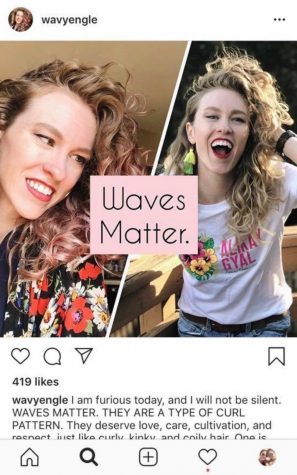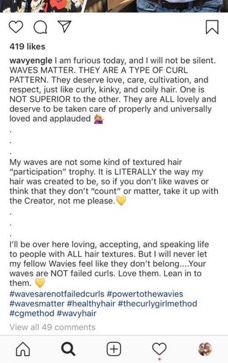Glorified victimization
Privileged individuals shouldn’t try to act oppressed
May 5, 2019
One day, as I was scrolling through my Twitter timeline, I came across a tweet that included these Instagram screenshots:


If you’re like me, you’ve probably immediately recognized a problem with this post. A white woman frustrated that her hair type is not accepted.
Waves matter. They are ALL lovely. If you don’t like waves or think that they don’t ‘count’ —
Surely, you’ve realized it by now. As someone who’s on Twitter for unhealthy amounts of time, I’ve seen plenty of hot takes like these. People who are privileged expressing how unfair life treats them has become a trend, as the person who originally tweeted the screenshots, criticizing Instagram user @wavyengle, phrased it as, “white people want to be oppressed so bad.” Everytime I see a post about a white girl complaining that wearing fake glasses as an accessory is offensive to people who need them to see, or that applying fake freckles as a part of your makeup routine for the day is insensitive towards people who are insecure about their freckles, I can’t help but ask myself why. Why do white people want to be oppressed so badly?
People of color who have textured hair do get treated differently; it’s a known fact that black individuals have been discriminated against for their natural curly hair in classrooms, the workforce, everyday life. In fact, in February, New York passed a law that bans discrimination based on hairstyles due to the amount of oppression black people have to face because of their natural hair. A white woman complaining about how people don’t accept her wavy hair is unsettling, almost shocking, because of the sheer absurdity of her claims.
People love “one-upping” each other — you’ve probably engaged in a conversation where you complain to your friend about how little sleep you got last night. But your friend has to respond by stating they got even less. Your friends jump at any given opportunity to prove that their life sucks a little more than yours and all of a sudden, you’re forced to feel as though your tiredness shouldn’t matter because they slept an hour less than you.
This want for oppression is quite similar. People want to be the victim and prove that they have their own problems too. That life isn’t easy for them, either. Talking to someone else about minor complaints from daily life has turned into a competition for whose life sucks more. But this is present in terms of bigger issues — take Black Lives Matter, for instance, an activist movement that allows for black voices to be heard, bringing awareness to the injustices they face; suddenly a voice belonging to someone who has never experienced an ounce of discrimination due to their skin color whines, “Why not all lives?” Well, I’ll tell you why, and brace yourself, it might be a hard pill to swallow: it’s not about you.
White people have dominated society since the beginning of time; social movements that empower minorities threaten white dominance as we root for people who overcome oppression to empower themselves and others. So in turn, white people fantasize their own struggles to ensure that others don’t feel that their ways to success and lives are too easy. They want to insert themselves in the narrative through All Lives Matter, shifting the focus from black issues to … well, nothing. Because white people simply don’t face the oppression blacks do.
And of course, I did some Instagram stalking on Kristin, the user behind @wavyengle who posted “Waves Matter” to see if anything else could fuel my frustration. I was not surprised to see the post deleted and her latest featured story dubbed “APOLOGY.” I tapped on the story, expecting a video that I had seen social media influencers post so many times before — vaguely acknowledge the problem at hand, somehow turn themselves into the victim but include an “I’m so sorry” to convince fans that they really are good people (optional: follow with some tears).
However, I found something very different. As sad as this sounds, I was surprised to see a long, genuine apology. Kristin acknowledged that she had made a mistake implying that she was oppressed and said something insensitive without realizing it. She claimed she was inactive for a couple of days to reflect on her words and asked questions to women of color to become more educated about the issue.
“I’m a white woman of privilege and … my eyes have definitely been open to that. I’m learning and educating myself through the advice of women of color around me of what it means to be a true ally now because I thought I was one and I still messed up and said something insensitive … I’m educating myself and I challenge you … to think about your privilege and use it to benefit the people around you.”
Even though I initially scorned her for her lack of self-awareness, I found myself listening to her entire (long) apology and was proud of the development I had almost never witnessed before. The privileged flaunt their “oppression” in means of getting sympathy and attention as an attempt to elevate their status. But instead of finding ways to get people to feel bad for their non-existent discrimination, privileged individuals should be finding ways to enhance the lives of everybody.
Instead of grasping at threads to prove that you have experienced oppression when you’re systemically privileged, think about all the black individuals who have been victims of police brutality. Or the Muslims currently in concentration camps in China. Or the discrimination LGBTQ+ folk receive in healthcare. Because it’s important to realize that trivial things like people wearing glasses as an accessory isn’t what matters, but addressing the blatant discrimination that costs minorities their basic human rights is.



























